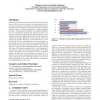Free Online Productivity Tools
i2Speak
i2Symbol
i2OCR
iTex2Img
iWeb2Print
iWeb2Shot
i2Type
iPdf2Split
iPdf2Merge
i2Bopomofo
i2Arabic
i2Style
i2Image
i2PDF
iLatex2Rtf
Sci2ools
128
Voted
CCS
2010
ACM
2010
ACM
Dialog-based payload aggregation for intrusion detection
Network-based Intrusion Detection Systems (IDSs) such as Snort or Bro that have to analyze the packet payload for all the received data show severe performance problems if used in high-speed networks. Recent research results improve pattern matchers based on efficient algorithms or using specialized hardware. We approach the problem in a completely different way by considerably reducing the amount of data to be analyzed with only marginal impact on the detection quality. Dialog-based Payload Aggregation (DPA) uses TCP sequence numbers to decide which parts of the payload need to be analyzed by the IDS. Whenever a connection starts, or if the direction of the data transmission between peers changes, we forward the next N bytes of traffic to an attached IDS. All data transferred after the window is discarded. Our analysis using live network traffic and multiple Snort rulesets shows that most of the pattern matches occur at the beginning of connections or directly after direction changes...
| Added | 06 Dec 2010 |
| Updated | 06 Dec 2010 |
| Type | Conference |
| Year | 2010 |
| Where | CCS |
| Authors | Tobias Limmer, Falko Dressler |
Comments (0)

